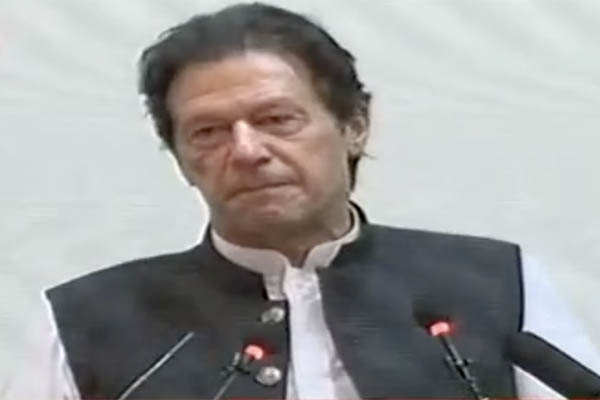
File photo. YouTube
P.M. Khan tells ministers the time for ‘performance’ has come, and urges them to deliver during the government’s remaining term
The incumbent Pakistan Tehreek-e-Insaf government can no longer hide behind excuses of its being new and lacking in government experience, Prime Minister Imran Khan said on Tuesday, adding it was now time to show “performance.”
Addressing a ceremony to sign ‘Performance Agreements of the Federal Government for the Year 2020-21’ in Islamabad, he said the initiative would “put pressure on ourselves” to improve governance beyond the levels of the past two-and-a-quarter years. “We no longer have an excuse that we’re new and are learning because most of us came into power for the first time. The time for performance has arrived,” he stressed.
Referring to U.S. president-elect Joe Biden, he said he had two-and-a-half months since his election to prepare for his presidency. “We were trying to complete our numbers [to form government], but he was being briefed on various ministries by bureaucrats,” he said, adding that Pakistan needed to “review” and amend its existing system. “We should have time after forming our teams to spend time on briefings to determine what is required by each individual sector,” he said, noting this would help set an agenda.
“It took us three months just to understand everything. What we had assumed from outside government was totally different from within government,” he said, adding that some actual figures weren’t even accessible for 1.5 years. “A new government should always come into power prepared,” he said.
The prime minister reiterated his criticism of the provincial autonomy guaranteed under the 18th Amendment of the Constitution, saying the country still did not “fully understand” the legislation. “Look at Food Security as an example,” he said, claiming that it was a federal subject but was controlled by the provinces. “If a province does not work with the center, and forms individual policies creating price differentials, this distorts national prices,” he said, claiming the federal government is blamed despite not having full control.
Terming the performance agreements a step in the right direction, the prime minister said they would help evaluate the performance of each signatory ministry, adding that it would prompt self-assessment within ministries to meet their targets. “The public must decide after five years whether we improved their lives; whether we fulfilled our promises to them,” he said, emphasizing that governance was not possible unless all ministries were performing in their individual capacity.
Summarizing his government’s targets, the prime minister said that he saw the power ministry as the biggest challenge currently facing the country. “This is the challenge that we need to focus on,” he said, adding its complexity “keeps me awake at night.” Noting that there were numerous aspects that needed to be rationalized and synchronized, he said the government needed to ensure affordable power for the public while addressing the crisis of spiraling circular debt.
The second challenge, said Khan, was that of subsidies worth Rs. 2,500 billion. “Subsidies should exist; they should benefit the downtrodden segments of society and uplift backwards areas,” he said, noting they should be used for wealth creation to boost exports. “There are many subsidies that benefit both poor and rich alike; those subsidies need to be targeted so they only aid exports and the impoverished,” he added.
If we don’t boost exports, we can’t increase wealth generation, he said. “I am very proud of our current account being in surplus for a fifth consecutive month,” he said, noting it as a “major” initiative. “If the current account remains in deficit, it puts pressure on the rupee; if the rupee is under pressure, it leads to inflation, which causes a burden on the public,” he said.
The prime minister noted that without increasing its exports, Pakistan would never be able to escape a vicious cycle of boosting its economy, increasing imports, reducing foreign exchange reserves, and having to go to the International Monetary Fund for a bailout. “Pakistan has had to go to the IMF 20 times,” he said. “We have to focus on exports,” he said.
Finally, said the prime minister, a major cause of concern was the “mountain” of pensions that needed to be fulfilled by the government. “No one has devised a proper plan for pensions,” he claimed, adding it was proving a major liability.
“We also need to specifically focus on agriculture,” he said. “It can generate employment and boost our food security,” he said, adding that Pakistan could greatly benefit from China’s experience in this regard.
“In the past two-and-a-quarter years, I have learned that we need to expedite our governance,” he said, claiming that certain projects should be prioritized to ensure they were pursued aggressively and were not delayed unnecessarily. “There are projects worth billions that get stuck in a ministry and lie there for months,” he said. “The top priority issues will be fast-tracked and in case of any bottlenecks, the ministry responsible will be penalized,” he warned, noting this was especially vital for the export sector—“anything that brings dollars into the country.”
